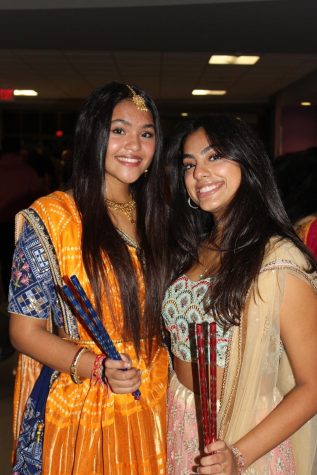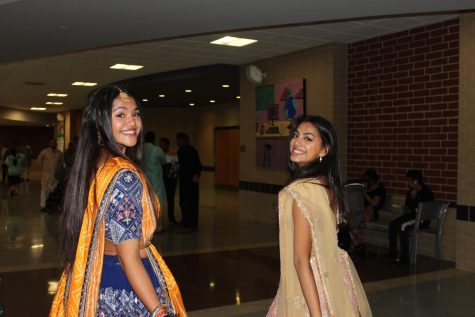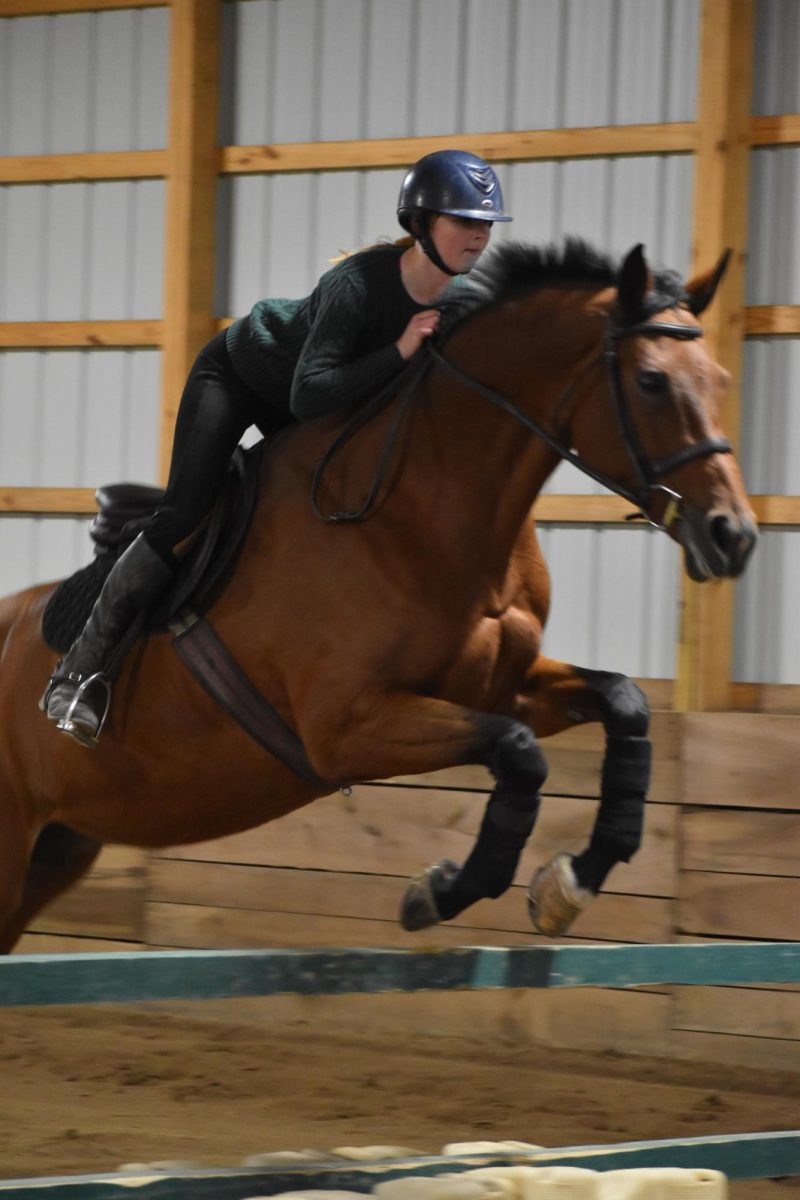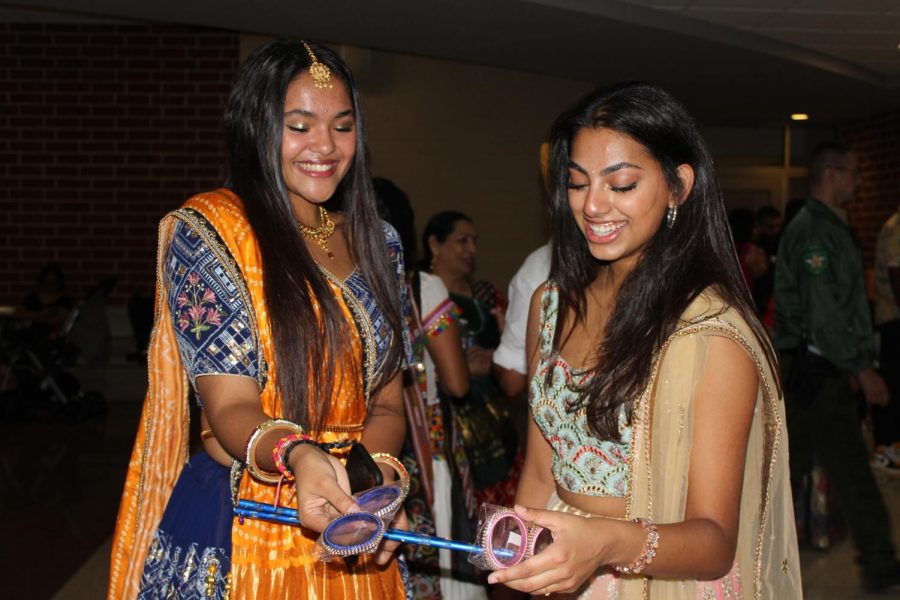While other Hindu holidays are more publicized, junior Keshvi Patel said Navaratri is one that is less well-known. Navaratri, which takes place from Sept. 26 to Oct. 5, is a Hindu holiday that celebrates women empowerment.
“Some people celebrate Navaratri more at home rather than publicly, so my non-Indian friends didn’t really know about Navaratri at first (until) I told them what the holiday is about,” Patel said. “Like for Diwali, a lot more of my non-Indian friends will talk about it and know about it compared to Navaratri because more people throughout India will publicly celebrate it.”

Patel is not the only one who said many people are unaware of Navaratri. According to Vasanthi “Indu” Vasudevan, tour guide and spokesperson for the Hindu Temple of Central Indiana (HTCI), people unfamiliar with Hinduism tend to have misconceptions about Navaratri.
“(A lot of people don’t recognize that) Hinduism is an extremely diverse faith. It’s somewhat unusual for Indians to refer to themselves as Indians. We tend to refer to ourselves by the linguistic group we belong to or the cultural group we belong to or the region that we came from,” Vasudevan said. “There are so many different ways of (celebrating Navaratri). You cannot say, ‘Oh, I spoke to so-and-so so that’s what all Hindus (do to celebrate Navaratri).’”
In fact, Vasudevan said the stories about Navaratri vary region to region and language to language.
“One of the stories is about an epic poem called ‘Ramayana,’ which is about an incarnation of God on Earth, and towards the end of that epic, there is a nine-day war against this demon who represents worldly desires,” Vasudevan said. “The other story is about the goddess, Durga. There was this particular water buffalo, Mahisha, and he wallowed to such an effect that he was simply absorbing all the energy around him so that people found themselves losing the will to live. In the gasps of life, people called out to Durga (for help) and she eventually slays him after a nine-day battle and energy comes rushing back into the world.”
To honor the story of Navaratri, Patel said she performs garba, a form of dance in circles around a picture or statue of Durga in the middle.
“(Garba) is a way of showing dedication and commitment to the holiday. I really like dancing and I meet a lot of my friends that I don’t see throughout the year,” Patel said. “I’ve invited some of my non-Indian friends to come too because they’ve shown interest in learning about our culture and I thought they would have fun (at garba) as well.”
Likewise, senior Rhea Adesara said she enjoys dressing up for garba and eating traditional foods.

“Usually at the end of the dance, there is a grand aarti, (where lights are offered for worship). Everyone joins and it’s super fun and colorful. We eat a lot of traditional foods around this time, and I love celebrating it with my family,” Adesara said.
Vasudevan said the HTCI’s garba event was on Oct. 2. In addition to garba, she said the different cultural groups who worship at the HTCI will each take one night to pray in celebration of Navaratri.
“They will be doing prayers that are typical of those particular regions and, most frequently, they’re going to have the women of that group get together to offer worship,” Vasudevan said. “Young girls are worshipped and seen as personifications of the divine. We emphasize to them that every one of them is divine, worthy of respect, and they’re offered new clothes and they feast. It’s a way of celebrating the fact that we as women are divine.”
While Adesara and Patel said they go to events at the temple for Navaratri, sophomore Sid Chavali said he does not celebrate the holiday extensively.
“I haven’t really done much in the past few years. The most I used to do was pujas (worship rituals) or my mom would make a traditional sweet. I didn’t really do anything at all this year,” Chavali said. “I think it’s because we’re in the U.S. and we don’t celebrate all the stuff they do in India as much so I guess (future) generations here may not celebrate it as much.”
Along those lines, Adesara said Navaratri celebrations here are different from those in India.

“In India, people celebrate a lot more. People are going to the temple every day and people are giving lots of offerings. Here, you’re celebrating on a smaller (scale) with just your family,” Adesara said. “It’s also not very publicized here so there’s not as many places to go to do these offerings and celebrations.”
However, Chavali said he does not think there needs to be a push to bring awareness to Navaratri.
“(None of my friends) really know about it and no one really talks about it,” Chavali said. “But I think it’s fine (that people don’t know about Navaratri). It’s more of a religious thing, right?”
On the other hand, Adesara said she hopes more people will learn about the meaning behind Navaratri.
“I feel like many people only know that garba and Navaratri (exist) but not really why we go to the dance and why we celebrate it. I do think more people should know about it because Navaratri is a women-empowering holiday so like any other empowerment movement and stuff, lots of people should know (about it),” Adesara said.
Ultimately, Vasudevan said she agreed with Adesara and said Navaratri has become a holiday her non-Indian friends look forward to celebrating.
“I think that especially among women, this festival is something my non-Hindu friends have really appreciated. They tell me that this celebration of a feminine concept of the Divine is particularly uplifting to them,” Vasudevan said. “Celebrating feminine art or feminine energy is perhaps not as common in every culture so there’s a lot of appreciation for Navaratri.”


































![British royalty are American celebrities [opinion]](https://hilite.org/wp-content/uploads/2024/03/Screenshot-2024-03-24-1.44.57-PM.png)



















![Chelsea Meng on her instagram-run bracelet shop [Biz Buzz]](https://hilite.org/wp-content/uploads/2024/04/IMG_2446-1200x838.jpg)
![Review: Quiet on Set: The Dark Side of Kids TV is the long awaited exposé of pedophilia within the children’s entertainment industry [MUSE]](https://hilite.org/wp-content/uploads/2024/04/unnamed.jpg)
![Review: “The Iron Claw” cannot get enough praise [MUSE]](https://hilite.org/wp-content/uploads/2024/04/unnamed.png)
![Review: “The Bear” sets an unbelievably high bar for future comedy shows [MUSE]](https://hilite.org/wp-content/uploads/2024/03/unnamed.png)
![Review: “Mysterious Lotus Casebook” is an amazing historical Chinese drama [MUSE]](https://hilite.org/wp-content/uploads/2024/03/0.webp)
![Review in Print: Maripaz Villar brings a delightfully unique style to the world of WEBTOON [MUSE]](https://hilite.org/wp-content/uploads/2023/12/maripazcover-1200x960.jpg)
![Review: “The Sword of Kaigen” is a masterpiece [MUSE]](https://hilite.org/wp-content/uploads/2023/11/Screenshot-2023-11-26-201051.png)
![Review: Gateron Oil Kings, great linear switches, okay price [MUSE]](https://hilite.org/wp-content/uploads/2023/11/Screenshot-2023-11-26-200553.png)
![Review: “A Haunting in Venice” is a significant improvement from other Agatha Christie adaptations [MUSE]](https://hilite.org/wp-content/uploads/2023/11/e7ee2938a6d422669771bce6d8088521.jpg)
![Review: A Thanksgiving story from elementary school, still just as interesting [MUSE]](https://hilite.org/wp-content/uploads/2023/11/Screenshot-2023-11-26-195514-987x1200.png)
![Review: When I Fly Towards You, cute, uplifting youth drama [MUSE]](https://hilite.org/wp-content/uploads/2023/09/When-I-Fly-Towards-You-Chinese-drama.png)
![Postcards from Muse: Hawaii Travel Diary [MUSE]](https://hilite.org/wp-content/uploads/2023/09/My-project-1-1200x1200.jpg)
![Review: Ladybug & Cat Noir: The Movie, departure from original show [MUSE]](https://hilite.org/wp-content/uploads/2023/09/Ladybug__Cat_Noir_-_The_Movie_poster.jpg)
![Review in Print: Hidden Love is the cute, uplifting drama everyone needs [MUSE]](https://hilite.org/wp-content/uploads/2023/09/hiddenlovecover-e1693597208225-1030x1200.png)
![Review in Print: Heartstopper is the heartwarming queer romance we all need [MUSE]](https://hilite.org/wp-content/uploads/2023/08/museheartstoppercover-1200x654.png)






















![Review: Ladybug & Cat Noir: The Movie, departure from original show [MUSE]](https://hilite.org/wp-content/uploads/2023/09/Ladybug__Cat_Noir_-_The_Movie_poster-221x300.jpg)

![Review: Next in Fashion season two survives changes, becomes a valuable pop culture artifact [MUSE]](https://hilite.org/wp-content/uploads/2023/03/Screen-Shot-2023-03-09-at-11.05.05-AM-300x214.png)
![Review: Is The Stormlight Archive worth it? [MUSE]](https://hilite.org/wp-content/uploads/2023/10/unnamed-1-184x300.png)


